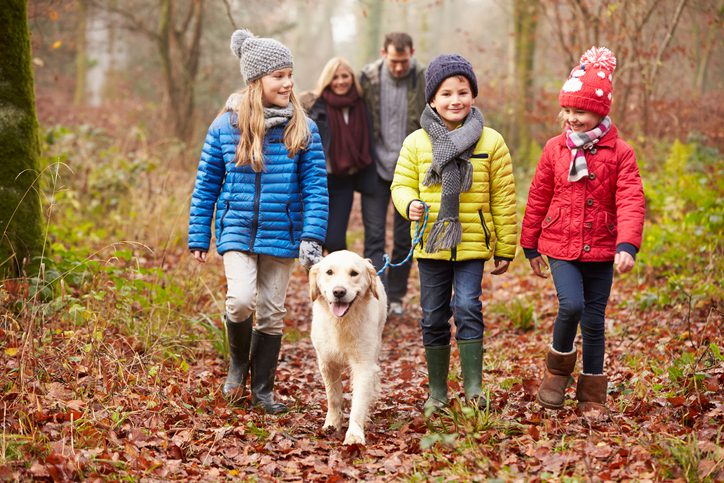1 in 3 parents say their dog strengthens family bonds

Authored by RSA
Those with a dog are more likely to say that their family life is ‘very happy’ compared to those without one (36% v 23%)According to a new survey of 2,000 parents, canine companions provide vital support to families. From improving mental health (80%), enabling physical wellbeing (80%) to bringing families closer together (72%)Over two thirds (69%) of families surveyed who train their dogs say that it has helped them get more out of the relationship with themMORE THAN insurance and its charity partner, Dogs for Good, release tips on how families can maximise their pup’s potential to boost happiness
Dogs are a much-loved feature of family life for many in the UK. But today, new research quantifies just how much our furry friends are boosting parents’ wellbeing and enriching the lives of families.
A new survey of 2,000 parents by MORE THAN insurance reveals the majority of those with dogs say their pup has positively impacted family life. Families revealed that their dog makes them more active (61%), gives them a routine (53%), and even increases the amount of time spent together (46%).
Of those surveyed, parents with a dog are more likely to say that their family life is ‘very happy’ (36%) than those without one (23%).
As well as the fundamentals of supporting mental and physical health, 72% of parents say their dog has brought their family closer together. A similar proportion (73%) also feel their dog has decreased their feelings of stress and anxiety. Moreover, 84% believe their dog provides their family with emotional reassurance during hard times, contributing directly to their family wellbeing.
Ed Bracher, CEO at Dogs for Good, said:
“We see daily how dogs can have a transformative impact on a family’s level of happiness. This new research underlines the power that canine companionship has in making life possible for countless families. Research shows dogs boost wellbeing and foster togetherness, with 75% of parents with disabled children stating their dog brings their family closer.
“Our Family Dog service provides guidance and ongoing support to parents of autistic children. It helps them make the most appropriate breed choice for their family and how to guide and nurture a dog. It also ensures families know how to meet the needs of their dog and build positive connections that bring benefits to the whole family. We regularly hear from families that the positive impacts include lowering parental stress, fostering quality time, and directly contributing to children’s development, boosting their confidence and communication skills.”
Training your dog is also found to be key in unlocking your family’s happiness potential. Over two-thirds (69%) of families surveyed who train their dogs agree that training has helped them get more out of their relationship with their furry friend.
While dogs can offer significant support to families, proper training is an essential part of dog ownership that benefits both families and their canine companions alike. Research reveals that the top three training methods used by families surveyed include using treats or rewards (65%), positive reinforcement (44%), and socialisation (37%). However, there are many ways we can support our furry friends with their own happiness and development.
To support this, Luke Mangion, MORE THAN’s Veterinary Surgeon, has provided his expert advice and top exercises you can do at home. These exercises can help to contribute towards your pet and family’s happiness.
Luke Mangion, Veterinary Surgeon at MORE THAN, says:
“Dogs are incredible additions to our lives, providing real companionship and happiness for families. However, it’s crucial to ensure our furry friends are healthy and happy too. It is therefore important that our dogs are well-trained and well-cared for, ensuring they too have a fulfilled family experience.
“This can include engaging your dog with activities designed for mental stimulation or perhaps integrating social time into their routine beyond the family unit.”
Top tips and advice
Clicker Training: Clicker training is a powerful technique that relies on a small handheld device (the clicker) to mark desired behaviours. When your pet performs the desired action, you use the clicker to make a distinct sound, followed by a treat or reward. This method helps your pet associate the click with a positive outcome, making them more eager to learn new behaviours.Puzzle Toys: Puzzle toys are excellent for mental stimulation. These toys can be filled with treats or kibble, and your pet must work to figure out how to access the rewards. This engages their problem-solving skills and keeps them mentally sharp, which is especially important for breeds with high intelligence.Socialisation: Exposing your pet to different people, animals, and environments is essential for their social development. This exposure reduces anxiety and fear while encouraging your pet to become more comfortable and friendly in various situations.Target Training: Target training involves teaching your pet to touch a specific spot, often with their nose or paw. This technique is versatile and can be used to teach various behaviours, from sitting to jumping through hoops. It provides mental stimulation and strengthens the bond between you and your pet.Positive Reinforcement: Positive reinforcement is a training method that rewards good behaviour with treats, praise, or affection. This approach encourages pets to repeat desired actions, as they associate those actions with positive outcomes. It strengthens the bond between you and your pet and creates a positive training experience.Patience and Persistence: Training takes time, and every pet is unique. Be patient and avoid getting discouraged if progress is slow. Consistency, along with a loving and positive approach, will eventually lead to a well-behaved and happy pet.





